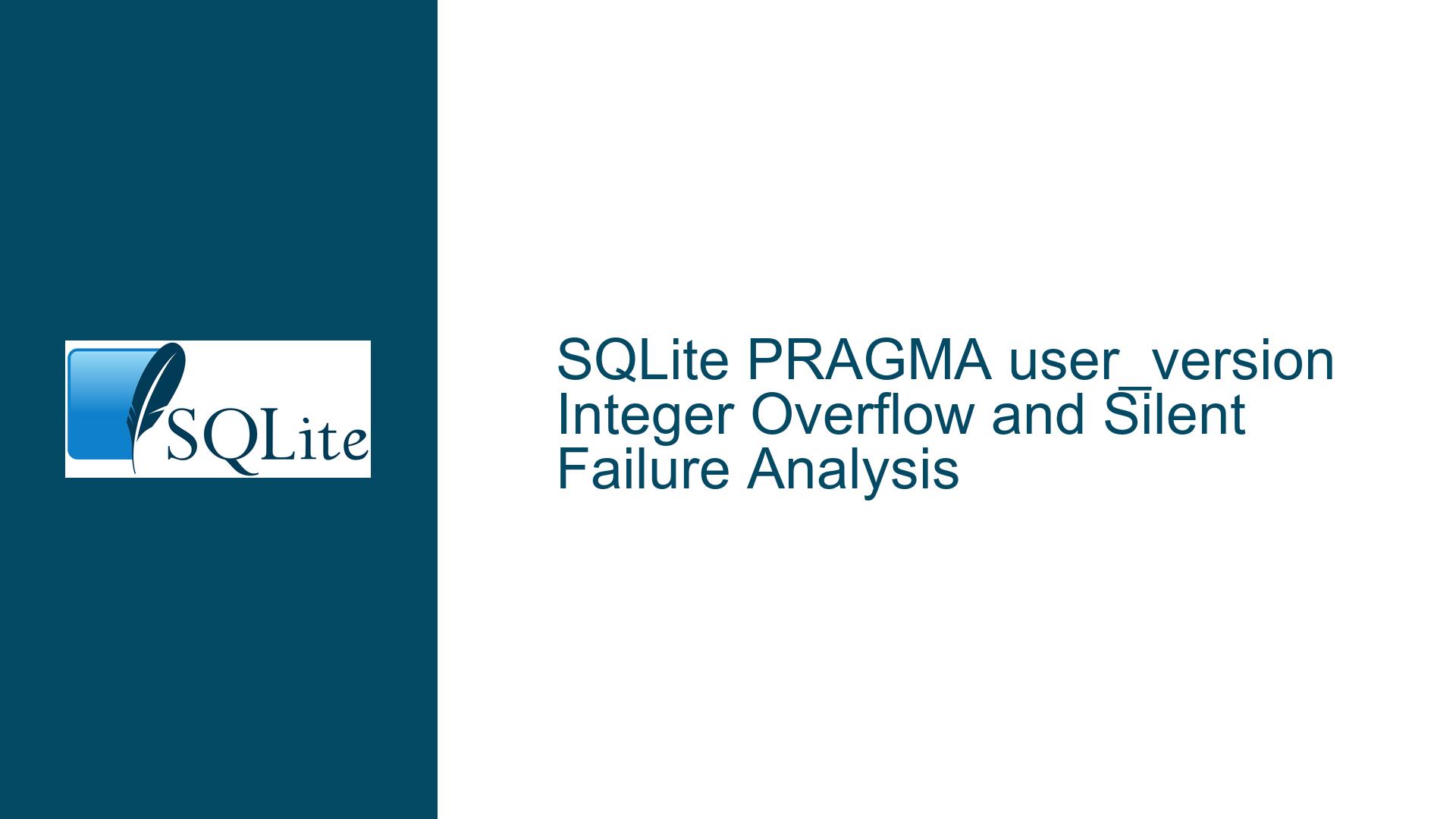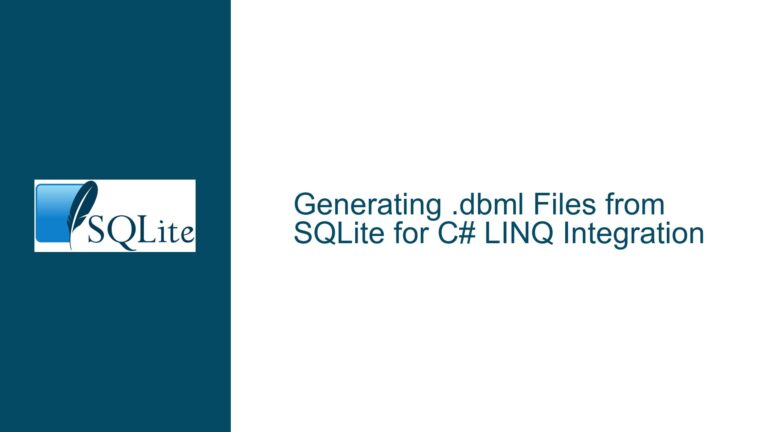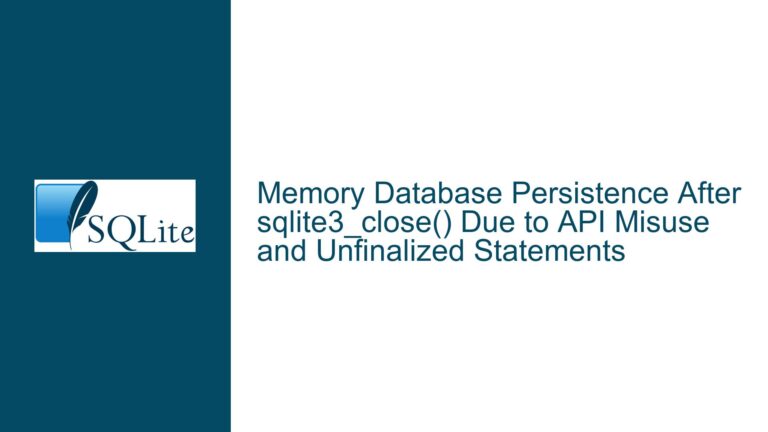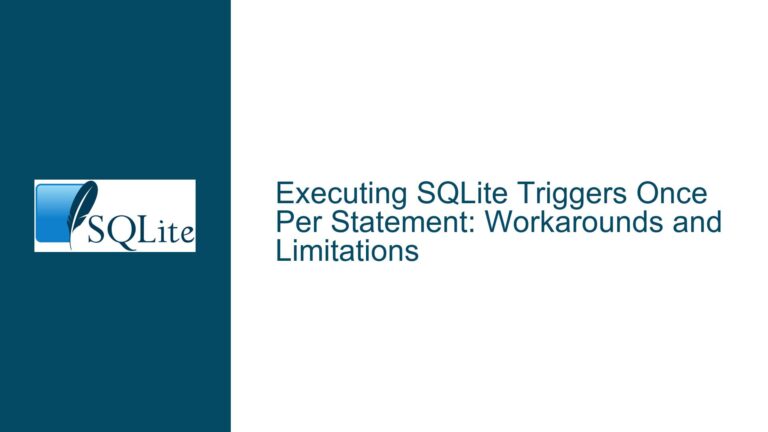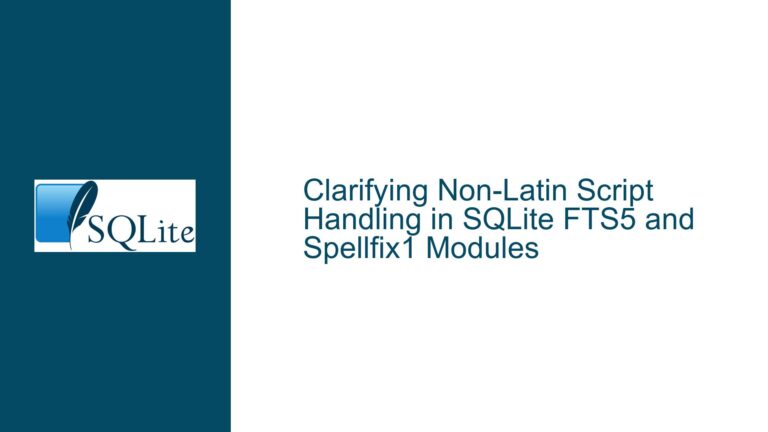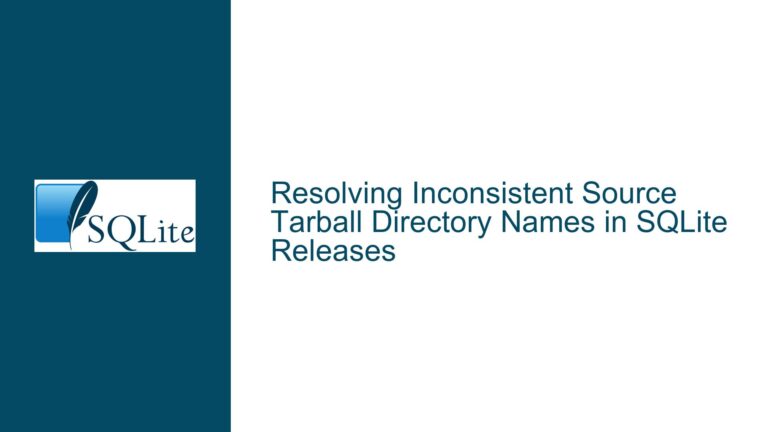SQLite PRAGMA user_version Integer Overflow and Silent Failure Analysis
PRAGMA user_version Integer Overflow and Silent Value Handling
Understanding PRAGMA user_version Overflow Behavior and Silent Value Rejection
The PRAGMA user_version mechanism in SQLite allows developers to store a 32-bit signed integer in the database header. This value is often used to track schema versions, migration states, or custom metadata. However, when values exceeding the 32-bit signed integer range (between -2,147,483,648 and 2,147,483,647) are assigned to user_version, SQLite exhibits non-intuitive behavior:
- The database returns
OK(SQLITE_OK) status code - The actual stored value becomes 0 for overflow cases
- No error is explicitly raised
- Subsequent reads return the clamped/truncated value
This behavior conflicts with typical developer expectations where input validation errors would occur for out-of-range assignments. The discrepancy between the OK status and silent value modification creates risks for applications relying on user_version for critical operations like schema migrations. When developers write code such as PRAGMA user_version = 2147483648 (which exceeds the maximum allowed value by 1), SQLite accepts the statement as valid but writes 0 to the database header. This creates hidden failure modes where applications may proceed under the false assumption that their intended version number was stored.
The core issue stems from SQLite’s design philosophy for PRAGMA commands:
- Silent failure for invalid PRAGMA values
- No input validation beyond basic syntax checks
- Automatic clamping to allowed ranges without warnings
These characteristics become particularly problematic with user_version due to its role in version tracking systems. A miscalculated version number could lead to skipped migrations, incorrect rollback procedures, or version comparison errors. For example, if an application attempts to set user_version to 4294967296 (a common 64-bit versioning pattern), SQLite will silently store this as 0, potentially causing catastrophic failures in deployment pipelines.
Root Causes: 32-Bit Integer Constraints and PRAGMA Value Parsing Rules
32-Bit Signed Integer Storage Limitations
The user_version value occupies 4 bytes in the SQLite database header, using a big-endian signed integer format. This imposes strict boundaries:
- Minimum Value: -2,147,483,648 (
0x80000000in hex) - Maximum Value: 2,147,483,647 (
0x7FFFFFFFin hex)
Any assignment exceeding these limits triggers integer overflow, but SQLite handles this overflow differently than standard programming languages:
- Positive Overflow: Values > 2,147,483,647 are stored as 0
- Negative Overflow: Values < -2,147,483,648 are stored as 0
- Hex Literals: Values starting with
0xare parsed as unsigned integers but clamped to the 32-bit signed range
For example:
PRAGMA user_version = 0x80000000; -- Parsed as 2,147,483,648 unsigned → clamped to 0
PRAGMA user_version = 0x7FFFFFFF; -- Parsed as 2,147,483,647 → stored correctly
This clamping behavior is undocumented in the SQLite PRAGMA documentation, leading to developer confusion. The storage mechanism does not use modular arithmetic (like 32-bit integer wraparound), making overflow detection non-trivial.
PRAGMA Statement Parsing and Value Conversion
SQLite employs lax validation for PRAGMA values to maximize compatibility across diverse use cases. The parsing logic follows these rules:
- Numeric Literals Only: The PRAGMA value must conform to SQLite’s numeric literal syntax
- Sign Handling: Leading
+or-operators are parsed separately from the numeric literal - Type Coercion: Non-integer values (e.g.,
11.5) are truncated to integers - Invalid Literals: Any non-conforming syntax defaults to 0 without errors
Consider these examples from the forum discussion:
PRAGMA user_version = -0x11; -- Evaluated as -(17) → stored as -17? No! Actual result: 0
PRAGMA user_version = 11.5; -- Truncated to 11 → stored correctly
PRAGMA user_version = 'text';-- Treated as 0 → stored as 0
The anomaly with -0x11 occurs because SQLite parses 0x11 as an unsigned hexadecimal literal (17), then applies the negative sign. However, the combined result (-17) is within the valid range but gets stored as 0 due to an undocumented parsing quirk when mixing signs with hex literals.
Absence of Error Reporting Mechanism
SQLite’s PRAGMA API lacks granular error reporting for value assignments. The sqlite3_exec() or sqlite3_step() functions return SQLITE_OK even when values are clamped or ignored. This design choice stems from historical compatibility reasons:
- Early SQLite versions prioritized backward compatibility over strict validation
- Many PRAGMAs (e.g.,
synchronous) accept multiple aliases (OFF, NORMAL, FULL) - Invalid values default to safe/standard configurations
For user_version, the absence of errors creates a disconnect between the developer’s intent and the database’s actual state. Unlike INSERT or UPDATE operations where constraint violations generate errors, PRAGMA modifications fail silently, requiring explicit post-write verification.
Mitigation Strategies: Validation, Monitoring, and Alternative Approaches
Step 1: Pre-Assignment Value Validation
Implement rigorous input checks before setting user_version:
def set_user_version(db_conn, version):
if not isinstance(version, int):
raise ValueError("Version must be an integer")
if version < -2147483648 or version > 2147483647:
raise OverflowError("Version exceeds 32-bit signed integer range")
db_conn.execute(f"PRAGMA user_version = {version}")
# Verify post-write
actual_version = db_conn.execute("PRAGMA user_version").fetchone()[0]
if actual_version != version:
raise RuntimeError(f"Version mismatch: expected {version}, got {actual_version}")
Key Actions:
- Type checking to reject non-integer values
- Range validation before PRAGMA execution
- Post-write verification to detect clamping
Step 2: Hexadecimal Literal Handling
Avoid hex literals in user_version assignments due to parsing ambiguities. If hexadecimal input is unavoidable, convert to decimal first:
-- Instead of:
PRAGMA user_version = 0x1A; -- Risky: parsed as 26 but may interact poorly with signs
-- Use:
PRAGMA user_version = 26; -- Explicit decimal
For programmatic generation:
hex_value = "0x1A"
decimal_value = int(hex_value, 16)
if decimal_value > 2147483647:
decimal_value = 0 # Or handle overflow as needed
Step 3: Post-Write Verification Queries
Always read back user_version immediately after setting it:
-- In SQL:
PRAGMA user_version = 2147483648; -- Attempt to set overflow value
SELECT CASE
WHEN (pragma_user_version = 2147483648) THEN 'OK'
ELSE 'FAIL: Value clamped to ' || pragma_user_version
END AS verification_result;
Expected Output:
FAIL: Value clamped to 0
In application code, automate this verification:
def safe_set_user_version(conn, version):
cursor = conn.cursor()
cursor.execute(f"PRAGMA user_version = {version}")
cursor.execute("PRAGMA user_version")
actual = cursor.fetchone()[0]
if actual != version:
conn.rollback()
raise ValueError(f"user_version clamp: {version}→{actual}")
return actual
Step 4: Schema Versioning Alternatives
For applications requiring version numbers beyond 32-bit limits, supplement user_version with a dedicated metadata table:
CREATE TABLE IF NOT EXISTS schema_metadata (
key TEXT PRIMARY KEY,
value BLOB
);
INSERT INTO schema_metadata (key, value)
VALUES ('schema_version', '4294967296')
ON CONFLICT(key) DO UPDATE SET value=excluded.value;
Benefits:
- Supports arbitrary precision integers or semantic version strings
- Enables transactional commits (unlike PRAGMA which auto-commits)
- Allows detailed version history tracking
Drawbacks:
- Requires manual JOINs when accessing version info
- Adds slight query complexity
Step 5: SQLite Wrapper Functions
Develop language-specific wrappers to enforce validation:
// C/C++ example
int sqlite3_set_user_version(sqlite3 *db, int64_t version) {
if (version < INT32_MIN || version > INT32_MAX) {
return SQLITE_RANGE;
}
char *sql = sqlite3_mprintf("PRAGMA user_version = %lld", version);
int rc = sqlite3_exec(db, sql, 0, 0, 0);
sqlite3_free(sql);
if (rc != SQLITE_OK) return rc;
// Verify
rc = sqlite3_exec(db, "PRAGMA user_version", verify_callback, &version, 0);
return rc;
}
Key Features:
- Type-safe interfaces for version setting
- Automated range checking
- Post-execution verification
Step 6: Monitoring and Alerting
Implement database health checks that include user_version sanity checks:
-- Daily monitoring query
SELECT
'user_version' AS pragma_name,
pragma_user_version AS current_value,
CASE
WHEN pragma_user_version NOT BETWEEN -2147483648 AND 2147483647
THEN 'OVERFLOW'
ELSE 'OK'
END AS status
FROM pragma_user_version;
Integration:
- Feed results into monitoring systems (Prometheus, Nagios)
- Trigger alerts when
status = OVERFLOW
Step 7: Database Migration Guardrails
Modify migration scripts to abort on user_version mismatches:
#!/bin/bash
EXPECTED_VERSION="$1"
ACTUAL_VERSION=$(sqlite3 "$DB_PATH" "PRAGMA user_version")
if [ "$ACTUAL_VERSION" -ne "$EXPECTED_VERSION" ]; then
echo "FATAL: Expected user_version $EXPECTED_VERSION, found $ACTUAL_VERSION"
exit 1
fi
Deployment Integration:
- Run this check before applying migrations
- Fail CI/CD pipelines on version mismatch
Step 8: Documentation and Team Training
Educate development teams on SQLite’s PRAGMA behaviors:
- PRAGMA Quirks: Emphasize silent failures and lack of transactions
- Validation Patterns: Teach pre-write range checks and post-write verification
- Alternatives: Promote metadata tables for complex versioning needs
Training Resources:
- Internal wiki pages detailing
user_versionpitfalls - Code review checklists verifying PRAGMA validation
- Workshops on SQLite’s storage internals
Long-Term Considerations and Best Practices
While the immediate fixes address value clamping and validation, long-term robustness requires architectural changes:
1. Versioning System Design
- Use hybrid approaches: Store major version in
user_versionand detailed versions in tables - Checksum critical schema objects (tables, indexes) for corruption detection
2. SQLite Version Awareness
- Track SQLite library updates for PRAGMA behavior changes
- Test versioning logic across SQLite 3.x variants
3. Defense-in-Depth Validation
- Implement ORM hooks to validate
user_versionon connection pooling checkouts - Add canary values in metadata tables to detect schema tampering
4. Disaster Recovery
- Backup
user_versionseparately from database files - Develop repair scripts to reset
user_versionfrom external configs
By combining immediate mitigation steps with strategic architectural improvements, teams can transform user_version from a hidden liability into a robust schema management tool. The key lies in accepting SQLite’s pragmatic design choices while layering application-level safeguards to enforce correctness.
